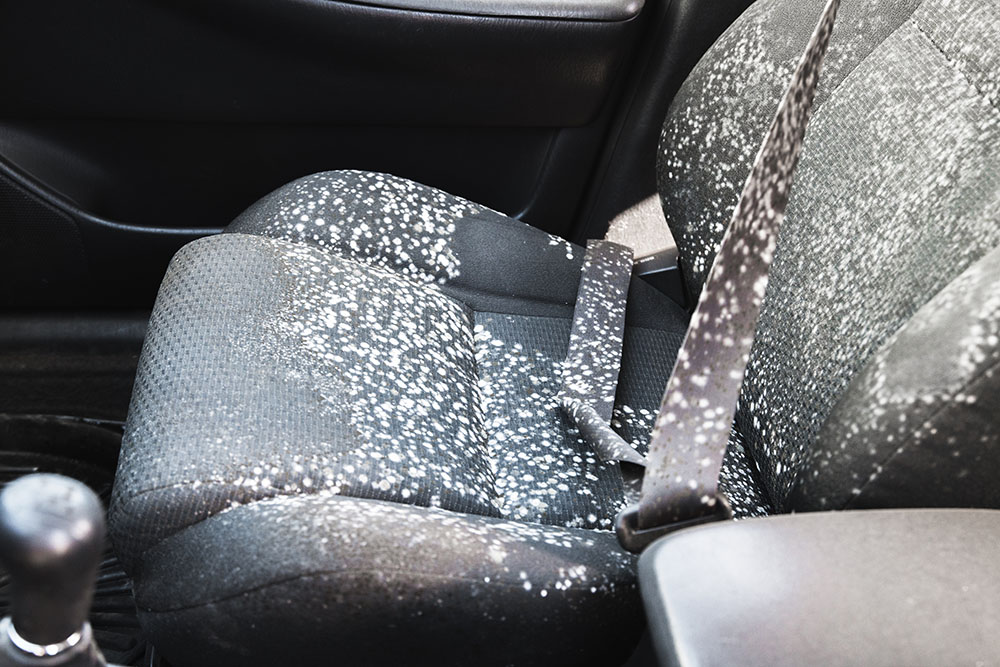How To Clean Mould In A Car

CONTENTS
- What is mould?
- Why is mould growing in your car?
- How mould can damage your car
- The risks of cleaning mould yourself
- What to do if mould is in your car
- Get in touch
A car is one of the more likely places for mould to start developing at a quick rate. Much like a house, a car requires constant maintenance and regular cleaning, or it will become susceptible to damage that may encourage mould to thrive.
We provide rapid and thorough mould remediation and vehicle cleaning services at ICE Cleaning. Our Dewpoint-accredited technicians can remove the mould in your vehicle and diagnose the root cause to help you prevent it from returning.
Read on to find out more about why mould grows in your car and what you can do when this happens.
What is mould?
Mould is a fungus that poses a significant role in our ecosystem, which unfortunately includes growing in places like our homes and vehicles. It is caused by excess moisture, like humidity, and can quickly spread unless a mould removal cleaners steps in.
You can find mould commonly growing in places where there are fabrics, building materials, and wet surfaces. These environments provide mould with the resources it requires and porous materials to seep into. Therefore, it becomes harder to remove, especially when mould spores embed themselves deep into surfaces.
Why is mould growing in your car?
This could be caused by various issues that combine to create a perfect home for mould. By knowing what these factors are, you can prevent mould from growing in your car in the future. Mould could be growing in your vehicle due to:
- Transporting damp materials in your vehicle without proper protection
- Transporting pets in your vehicle that are carrying mould spores in their fur
- Water seeping in due to a cracked window, unsealed doors, or a leaking sunroof
- Flooding inside after a severe rainfall or driving through a deep puddle.
- Food left inside or spilt drinks that seep into fabrics
- Leaking air vents
- Not drying your vehicle properly
You will usually see signs of mould in your car when white, green, black, or grey fuzzy patches begin growing on fabrics like your seats or the carpets in your vehicle. Another sign is a musty smell, which is likely to be more potent in a contained space like a car.
How mould can damage your car
If mould is inside your vehicle, it could indicate an underlying issue you have not noticed yet. If this issue was due to excess moisture, it could mean there is a leak in your car or minor flooding occurred inside. Moisture on metal can cause it to rust, which will damage your car’s components.
Mould is also not a surface issue — even if you wipe away the unsightly fuzz from your seats or the carpet, it might return in a few days. The porous materials in a vehicle give mould a place to embed itself, where it will reach the underlying surface and cause irreversible damage to the interior.
The risks of cleaning mould yourself
Once mould starts growing, it will eventually release airborne spores. When you try to clean the mould with DIY solutions, such as dangerous chemicals or attempt to scrub away the mould, you could put your health at risk. Aggravating mould by scrubbing triggers spores to be released, which might result in illness.
By attempting to clean or continue driving your infected vehicle, you could bring mould spores into your home. If you inhale mould spores, you may have a severe reaction. You could experience an allergic reaction or show severe symptoms such as:
- Fever
- Sinusitis
- Coughing
- Fatigue
- Skin and eye irritation
- Headaches
- Nausea
Using dangerous chemicals could also cause skin or lung irritation if you breathe in toxic fumes. You should therefore avoid cleaning mould by yourself and bring in professionals.
What to do if mould is in your car
You must contact a specialist cleaning company that is qualified in dealing with mould. Because mould cannot be easily rectified with commercial cleaning products, it requires industrial solutions and tools to kill it at the source.
You can do some things in the meantime to minimise the spread and keep yourself safe. Before following these steps, make sure you are wearing gloves and a mask and do not try to clean the mould yourself. For now, you should:
- Place the vehicle in a dry, ventilated area out of direct sunlight
- Ensure all seals are intact and inspect for mould
- Always close your windows properly
- Remove any damp materials from your car like clothes, umbrellas, towels, or seat covers.
- Identify any leaks or drainage damage to your vehicle
- Purchase a car dehumidifier to absorb and control moisture
- Contact a mould removal service and vehicle cleaning company
Get in touch
Our professional cleaners can use industry-leading tools and effective non-abrasive solutions to decontaminate and restore your car. They are available across the UK, 365 days a year, including bank holidays.
You can discover more about our mould removal services by talking to our friendly team at 0208 066 0360 or sending a query to enquiries@icecleaning.co.uk.

Speak with me today,
I’m here to help
By asking you a few questions either via phone or email I can immediately provide a realistic estimation of the cost.
You’re in good company. We’ve cleaned for the following commercial clients… View all

Why choose us?
- Cater to a wide variety of cleaning situations
- Nationwide coverage, available 24/7
- Cater to commercial and domestic clients
- Free survey provided prior to quotation
- Emergency response team
- Offer a bespoke service designed to suit all your needs
- All technicians hold professional health and safety qualifications, including BICSc, IOSH, Dewpoint Professional & Safe Contractor
We’re fully accredited
We place best practise, professional expertise and health and safety at the core of our business. We’re fully compliant with all legal obligations. You can view a list of our accreditations below, or visit our Health & Safety page for more information.











-RGB-small.1707319151.jpg)




















